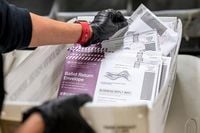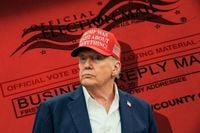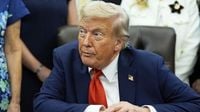President Donald Trump’s recent announcement proposing sweeping changes to the way Americans vote has sent shockwaves through the political landscape, igniting debates from kitchen tables to Capitol Hill. On August 20, 2025, Trump declared his intention to ban absentee ballots, mail ballots, early in-person voting, and the use of voting machines. Under his plan, all voting would take place on Election Day and would be conducted exclusively with paper ballots. The rationale, according to Trump, is to prevent voter fraud and restore honesty to the nation’s elections.
But are these changes as straightforwardly beneficial as the former president claims? According to a wealth of studies and historical context, the answer is far from simple—and perhaps even the opposite of what Trump intends. As Slate reports, every credible study on the subject finds that voter fraud in the United States is exceedingly rare, and there is no evidence tying fraud to voting machines. In fact, research suggests that reverting to paper ballots could actually open the door to more fraud, not less.
To understand why, it’s worth revisiting a bit of American history. The term “stuffing the ballot box” hails from the era of paper ballots, when it was all too easy for unscrupulous actors to slip extra ballots into the box. The phrase “vote early and often” also emerged during this time, reflecting the antics of urban machine politicians who would shuttle loyalists from one polling station to another, impersonating voters in multiple precincts. These old-school tricks have largely disappeared thanks to the advent of voting machines, which are much harder to manipulate, and the professionalization of voter registration systems.
Modern studies back this up. A comprehensive look at voting in six swing states during the 2020 election found fewer than 500 claims of fraud out of approximately 25 million votes cast. Instances of mistakes due to machine error were almost nonexistent, as were cases of voter impersonation. In fact, one study found only 31 such instances between 2000 and 2014, a period in which more than 1 billion ballots were cast. The 2016 election saw just four cases of voter impersonation nationwide. And despite persistent rumors, there are no recorded instances of noncitizens illegally voting. “It just does not happen,” as Slate bluntly puts it.
Mail voting, too, has proven remarkably secure. Occasionally, the postal service may misplace or delay ballots, and there have been rare cases of mail carriers discarding mail that included ballots. But these incidents are extremely uncommon and involve only a handful of ballots amid mountains of mail. The overwhelming evidence is that mail voting is safe, reliable, and essential for many Americans who cannot be present at their polling place on Election Day.
Trump’s plan, however, would roll back decades of progress in making voting accessible. Absentee and mail voting have deep roots in American democracy, dating back to the Civil War. In 1864, nineteen Union states enacted laws allowing soldiers in the field to vote absentee, sending their ballots home. This innovation was a resounding success, giving those fighting to preserve the Union and end slavery a voice in the democratic process. The tradition expanded during World War I and was enshrined in federal law during World War II, ensuring that men and women in uniform could participate in elections even when deployed far from home.
After the wars, absentee voting became increasingly common for civilians as well. People’s lives grew more mobile, and it was not always possible to be home on Election Day. Absentee and mail ballots became a lifeline for many, from military personnel to business travelers to those with demanding work schedules. Trump’s plan would strip away this lifeline, effectively disenfranchising a broad swath of the electorate.
Who would be most affected? The list is long and varied. Elderly voters, especially in states like Florida and Arizona, often rely on mail ballots to avoid standing in long lines under the hot sun. Many of these voters are Republicans who have consistently supported Trump in past elections. Rural Americans, too, frequently vote by mail because of the vast distances to polling places. On some tribal lands, Native Americans live more than 200 miles from the nearest polling station. Blue-collar workers, oil field workers, and those in jobs that require travel or long shifts—think truck drivers, airline staff, and train crews—also depend on absentee or early voting to make their voices heard.
And let’s not forget military personnel. Under Trump’s proposal, service members stationed away from home would lose the right to vote absentee unless some as-yet-undefined accommodation is made. “The administration claims that, despite Trump’s categorical opposition to absentee ballots, there will be some sort of accommodation for people in the military, but we know no further details,” Slate notes. The lack of clarity raises troubling questions: Will the exception apply only to those overseas? What about service members based in another state, or those about to deploy? The answers remain elusive.
The ripple effects extend further still. If special accommodations are made for military voters, what about diplomats, federal employees on assignment, or civilians like airline pilots and Amtrak workers who are away from home on Election Day? The proposed changes threaten to create a patchwork of exceptions and confusion, undermining the very integrity Trump claims to champion.
Beyond disenfranchisement, Trump’s plan would likely slow down the voting process dramatically. Abolishing mail and early voting means more people must vote in person, leading to longer lines and wait times. Those with flexible jobs—middle-class and upper-class professionals—might manage, but hourly workers, first responders, and others who can’t easily take time off could find themselves effectively barred from voting. As Slate points out, the very people who keep our hospitals, factories, and farms running may be the ones most likely to lose their voice at the ballot box.
Ironically, the plan could backfire politically. Many of the voters who would be disenfranchised—elderly Republicans in Florida and Arizona, rural voters, and military personnel—have historically supported Trump and the Republican Party. “If Trump succeeds, he will undermine our political system and our democracy. But he may also disfranchise more Republicans than Democrats,” the article warns. “Be careful what you wish for, Mr. President—you might get it.”
As the debate over voting reforms rages on, one thing is clear: the proposed changes would mark a dramatic departure from American tradition and could have far-reaching consequences for the nation’s democracy. Whether or not Trump’s plan moves forward, the conversation it has sparked is sure to shape the future of voting in the United States for years to come.




